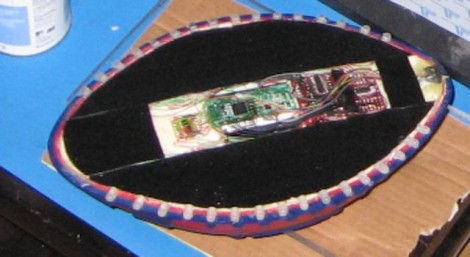
[Ben Kokes] threw together a hardware package to capture data from a football. In the center of a Nerf football he made room for an accelerometer, gyroscope, and an electronic compass. All three can capture 3-axis data and, along with the LEDs ringing the circumference, they’ve controlled by an XMEGA192 microcontroller.
This makes us think back to a time when baseballs with a built-in speed sensor first hit the market… does this hack have mass marketing potential? Perhaps, but only if the $225 sensor price tag were greatly reduced. When we first started reading the description we hoped that [Ben] had coded an interpreter that would render 3D playback video from the data. He hasn’t done that, but from the data graphs he did assemble we don’t think that functionality is out of the question. We’ll keep our fingers crossed.













